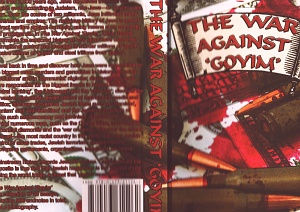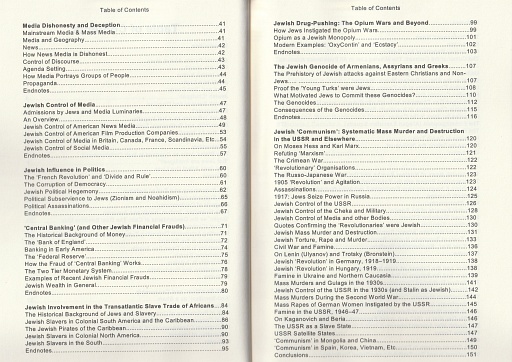Review of Chris Caskie War Against Goyim
Book. Second edition now available (November 2023). His main updates are (1) Chapter on Jews, Christianity and the Church as symbiotic with Jews, as a mutual money-making scheme; (2) Chapter on Jews and the Inquisition, and Spain, Portugal, Mexico.
He's added some material on early Jews, Jews and feudalism, the Caribbean and the Americas, the 30-Years War, 20th century Jewish destructiveness, and so-called feminism. As more dots get connected, the smoothness of the reading impresses.
First published January 2022. PDF downloadable from https://chriscaskie.podia.com/ $10 NZD 3 March 2022.
— This review is of the first edition. 21 November 2023
 Chris Caskie has made a video, and put on the Jewish-owned site Odysee. So it may not last...
Chris Caskie has made a video, and put on the Jewish-owned site Odysee. So it may not last...
The Jewish Problem for Newbies You may watch it here (opens in a new tab). It is somewhat experimental.

^ Paperback cover design back and front

^ Scan of part of table of contents
Important! May well be a new style of book on the Jewish Problem. This is the first book known to me taking a top-down view of Jews and the world.
Chris Caskie has produced a book based largely on Internet material, sorted by topic; he has selected twenty themes and presented them in roughly equal chapters, with the exception of his long chapter on Jews in the USSR. As his title suggests, The War Against ‘Goyim’ uncompromisingly considers 'Jews' as enemies of all others. (The title does not mean there's a hostile country called 'Goyim' as someone I spoke to believed!).
I'm personally reminded of H G Well's Outline of History of almost exactly 100 years ago. That book was widely popular, and had the novelty of trying to present the history of the whole world. And it proved that there was popular demand for serious history. But Wells, all his life, missed the Jewish issue, and was a failure in the revisionist sense. Official historians were uneasy about Wells, but of course none commented on his omission of Jews.
Caskie's book may prove more influential than Wells's. It may help spark histories of the most diverse topics: corruption of medical science by Jews; influence of ships from the Mediterranean outwards; the Turkish regions; India and China; the psychology of language, long infancies, education and irrationalities; studies of secret causes of deaths and population control, and in general the use of concealment and crypsis. Non-Jews will have to consider whether they should counter Jews by secret methods.
Many people have been involved in this sort of revisionist material. As regards readership, probably the book is well-suited to newbies, people of any age who have never been in contact with these ideas, or young people who wish to read and discover and interpret forbidden thoughts.
I'd like to suggest that schools, libraries, colleges, universities might buy copies so that students can read the book without being targeted.
The War Against Goyim is 6" by 9", perfect bound (i.e. pages glued to the spine of the cover, after which whole book is trimmed. The cover is matte finished, like Bjerknes's books. Caskie has chosen sanserif type—good for reference books. Each chapter has endnotes of sources, some of which Caskie put onto archive.org.
His bibliography (about 40 pages) is in two parts, the first being printed material, the second being online. The demarcation isn't strict; Miles Mathis for example is in the printed sources. Most of the books and Internet sources have a useful description, to help situate them intellectually.
He is refreshingly accurate: Foxman in 2007 is 'Rubbish with no basis in reality'; Lipstadt in 1994 as 'Absolute rubbish'; David Baddiel 'A short but boring book'; Nathan Cofnas 'a good example of Jewish pilpul and prevarication'; Christopher Hitchens on Kissinger as 'exposing Kissinger as a war criminal. Fails to connect the dots ...'; Kevin MacDonald, 'because the book is academic, it pulls punches'.
The brief comments are very useful. The positive comments in particular must enable newcomers to identify helpful material. By contrast, MacDonald's books have bare lists of titles in his bibliography, and he says nothing about his book list, giving bare author and title information. However, MacDonald has indexes in his books, though they aren't very helpful in tracing ideas.
Warning: the printers and distributors (lulu.com) have dropped Beware the World to Come by Christopher Bjerknes. Caskie has now had his book disrupted, also by lulu. At the time of writing (early February, 2022) computer searches for his book have, in the top four places, links from Bitchute, which is a Jewish-owned site with a record of censorship. It seems uncertain to me whether he will get much publicity.
I'd like to try to summarise the currents moving through revisionist movements over the years. Revisionist books so far have tended to be single-issue monographs, for example on the 'Holocaust' fraud. Or they have been rather cringing works, either omitting Jews (as in Kemp's March of the Titans) or being cautious and evasive (as in MacDonald's work), incomplete revisionism, completely omitting money frauds, wars, starvation, etc). There are monographs on Jews, tending to present them as religious, without commenting in detail on their actual activities (Hoffman and E Jones seem to me of this type). Many writers are 'scholarly' in the weaker senses, substituting textual matter for genuine grasp of events. Most histories of war are of this type, unaware of the raw facts of costs and plans and deaths and long-term effects. And most historians are a sad shadow of what history should, presumably, be; they inherit a huge legacy of evasion. Machiavelli's theory of history looks very feeble, for example.
Few historians make allowances for censorship and suppression, and simple non-recording of important acts. In such circumstances, it's obvious that guesswork and conjecture and hypothesis testing are essential. David Irving for example, says nothing much on Jewish collaboration and Jewish money subsidisies, as he seems unlikely to have access to bank records.
Jewish attitudes of 'scholarship' and deception lean them to forgery. The early Church was plagued by this. And modern media produce more fake material than true. Money power is routinely ignored; 'protestors' are paid to demonstrate, for the media. Armies have been paid by Jewish money promises for many centuries, and military power is linked with religious power: After 1066, Oxford University was founded. There are fascinating similarities with blasphemy and heresy and treachery, similar to the horror of simple Americans to 'Communism' and 'racism'.
Repetitive propaganda doesn't last forever. I remember Alistair Cooke—a Manchester fellow-traveller of Jews, now I think forgotten. Jordan Peterson, after taking money from Soros and getting huge promotion, is now subsiding. Many web-based people seem to have run out of motivation; I won't name names. archives. But Jewish funding is positively terrifying. (A good example is London University's sas.ac.uk, the so-called 'School of Advanced Study', which has mutually-congratulatory reviews of ignorant people's books).
Chris Caskie has steered around obstacles and traps, and written a useful book with well-selected sources. This itself is quite an achievement, in view of the vast deposits of feeble and erroneous material bequeathed to us. When you next see people gazing at TV news rubbish, or failing to understand events from their own lives, or quoting obvious rubbish from religions, ask yourself if you want to be like that. If you prefer curiosity about the world, this book may change your life.
Chapter-by-Chapter Survey
These discussions are in no special order, as suggested by the author. I haven't covered the entire book; there's a good chapter summarising 'Feminism' for example.
The Jewish Genocide of Armenians, Assyrians and Greeks
Caskie starts with earlier times, of which Hilaire Belloc said the average Englishman had never been allowed to hear of, and Arthur Butz described about fifty years later, largely in Cyprus, though these seemed to use the simpler model of direct Jewish hostility.
Caskie has condensed Bjerknes' book of 570-ish pages (pdf downloadable free) and other sources down to about ten pages.
‘Central Banking’ (and Other Jewish Financial Frauds)
The Jewish Hoax of Nuclear Bombs and the Mythical ‘Cold War’
Caskie doesn't look at the evidence that 'nuclear power' is another fraud. Jews seem to love big mines for uranium ores, covering big regions with slag, and pretending the whole process is 'green'. In fact, the whole issue of Jewish corruption of science is hardly know, yet. Caskie's book will help change this.
The Jewish Diamond Industry and Conflict Diamonds
Well-researched piece—42 different references. Caskie makes Interner research and writing look easier than it is.
The Cultural Selection Process is one attempt to explain Jewish behaviour.
Caskie takes the view that the bosses of Jews enforced a strict separation of Jews over many generations. And in effect blames others for co-operating—for example, in Poland, preceding the expulsion, or planned movement, out of Spain and Portugal. He dates this from about 70 CE (the Jewish version of 70 AD—though AD is itself a Jewish time stamp). Others think the time interval was far longer.
An interesting fairly brief chapter, usefully surveying the topic without being unreasonably precise.
Jewish Control of Media
Jewish Involvement in the Transatlantic Slave Trade of Africans and Jewish Drug-Pushing: The Opium Wars and Beyond
Jewish Drug-Pushing looks at India and China from the 1830s, and the Sassoons, who arranged to grow opium poppies in India to be pushed onto China. I need hardly say that Hollywood, Spielberg etc have never made movies on this, or that historians praising Victoria place little emphasis on these events, or the lessons they suggest for Jewish impacts.
The Supremacy and Evil of Judaism
I must mention Zionism and the Crimes of Jews in Palestine and Jewish-Zionist Wars in the Middle East and 9/11: Jewish Mass Murder and Fraud
A good aspect of this book is the fact that Caskie has retained his indignation. Many historical writers lose the horror (if they ever had it). The Thirty Years War ... devastated half of Europe? Yawn. Second World War ... Millions of raped women? Better not mention them. Bombed cities? Who cares!—Official histories, Jewish media, civil servants, generals, wouldn't like it. Possibly there will be ever-increasing assaults on whites, who will say "We dindu nuthin".
Caskie's Conclusions chapter is uncompromising: 'Jews are the biggest threat facing the world today.'
Rae West big-lies.org 2 Feb 2022